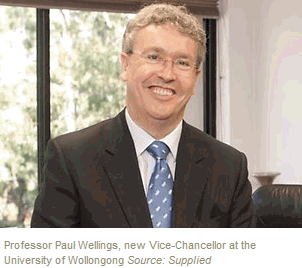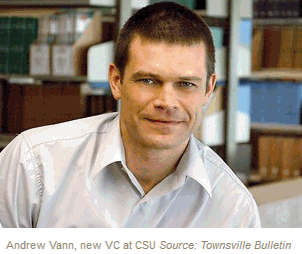|
|
|
|
|
|
|
News & Views item - January 2012 |
![]() Some Comments from Two Newly Installed Vice-Chancellors. (January 16, 2012)
Some Comments from Two Newly Installed Vice-Chancellors. (January 16, 2012)
 The
beginning of the year has seen Paul Wellings take over as vice-chancellor of
the University of Wollongong while Andrew Vann slots into the
vice-chancellorship and presidency of Charles Sturt University.
The
beginning of the year has seen Paul Wellings take over as vice-chancellor of
the University of Wollongong while Andrew Vann slots into the
vice-chancellorship and presidency of Charles Sturt University.
Professor Wellings, an entomologist by training, became vice-chancellor of the UK's Lancaster University where he served from 2002 - 2011. During that time he also served as Chair of the 1994 Group of smaller research-intensive universities and as a member of the Board of the Higher Education Funding Council for England.
Professor Vann, an engineer by training, came from the University of Bristol in 1996 to take up a lectureship in structural engineering at Central Queensland University. In 2004 he was appointed pro vice-chancellor, information services and technologies at James Cook University where he served until he became V-C of Charles Sturt University at the beginning of 2012.
Professor Wellings has made it known that in his view research excellence should be funded wherever it occurs, rather than concentrating resources in a few would be recipients based on overall rankings, but he also wants societal impact to play a role in determining research funding. However, just how he would formulate the determination of impact quality in specific cases has yet to be revealed (but see NSF Continues to Fiddle With the Meaning / Utility of "Impact").
Professor Wellings' state goals?
We'll be looking at what the major research assets are. Some of the research infrastructure is very very good: [plans for] the health and medical precinct, innovation campus and the SMART facility are all new major investments that need to be fully exploited. Some, such as the SMART facility, are world class.
Then we need to ask what transformative projects we should be investing in,'' Wellings says. He lists health, biomaterials and a broader range of engineering, but is also interested in the creative arts. And finally, How do we make sure citizens in regional cities like Newcastle and Wollongong have the same skill sets as places like Sydney, to allow them to compete for the jobs of the future economy?
As for Andrew Vann, he told The Australian's Stephen Matchett: "When I
move on I want the university to be a power-house for rural NSW and continue to
lead in distance education," and while he is intent on realising the proposed medical school,
intended for Orange, further expansions are not part of his agenda, saying the
med school is core business for CSU. "If you train doctors in the bush they stay
there."
education," and while he is intent on realising the proposed medical school,
intended for Orange, further expansions are not part of his agenda, saying the
med school is core business for CSU. "If you train doctors in the bush they stay
there."
He also wants to improve CSU's research profile but: "There will be no new research areas, I am happy with the mix," and then adds, "I have a great sense of the contribution regional universities make, itís much more important to their regions than that metropolitan campuses make to cities."
CSU's leadership in distance learning Professor Vann considers to be of great importance while noting that he foresees significant future challengers. And when it comes to academic staff research he looks to retain the current proportions between teaching, research and administration -- 60% of their time to teaching, a third to research and some 7% to administration.
But troublesome is the fact of a funding crisis for Australia's Universities as a result of the over dependence on international student fees which are what is rightly seen as soft money.
That eats at the very fabric of the nation's universities' and subverts their teaching and research potentials for the nation's commonweal.